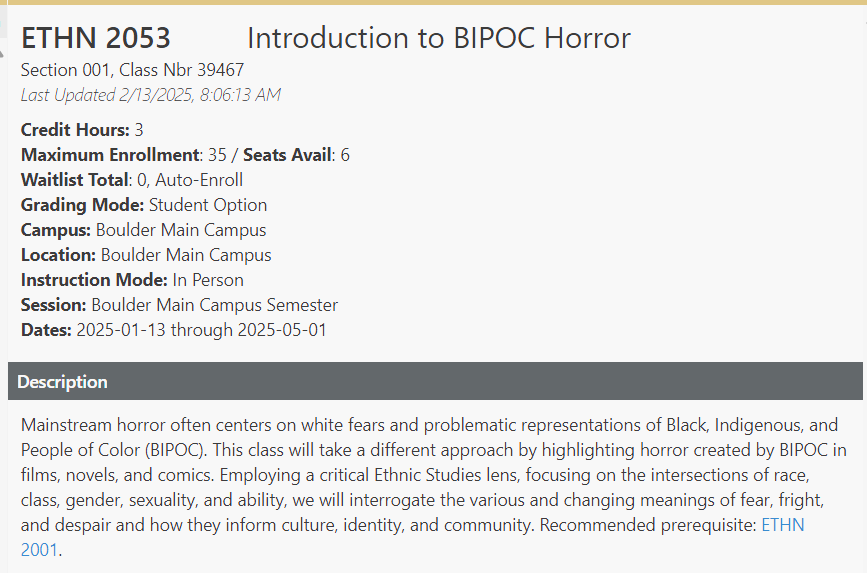Colorado educator criticizes universities for prioritizing political ideology over real skills
Students at the University of Colorado can learn about “BIPOC horror” this semester.
“Introduction to BIPOC Horror” will highlight “horror created by BIPOC in films, novels, and comics.”
This is in contradiction to how “[m]ainstream horror often centers on white fears and problematic representations of Black, Indigenous, and People of Color,” according to the course description.
The course, taught by Jessica Ordaz, will use “a critical Ethnic Studies lens,” while “focusing on the intersections of race, class, gender, sexuality, and ability.”
Students will also “interrogate the various and changing meanings of fear, fright, and despair and how they inform culture, identity, and community.”
Her research interests include “the multifaceted history of veganism and plant based foods throughout the Americas, focusing on colonization, food politics, and social justice,” according to her university bio. This is part of her interest in “BIPOC veganisms.”
Ordaz did not respond to emailed questions sent twice in the past several weeks that asked about the creation of the course and if there was any research done to determine its value. The university’s media relations team did not respond to similar inquiries from The College Fix.
However, a Colorado educator criticized the course and said universities should describe the value of a course when offering it to students.
“Students deserve to know whether the courses they take will provide a return on investment,” Priscilla Rahn, a master teacher, told The Fix via email. “If universities continue to prioritize political activism over workforce readiness, they must be honest about the potential consequences for graduates.”

Rahn is also a licensed principal and an ambassador for the National Center for Public Policy Research and its initiative, Project 21.
She also said identity focused courses like this one can “provide an interesting academic lens, but they risk reinforcing ideological echo chambers.”
“Courses that focus primarily on identity politics risk limiting students’ ability to engage with diverse perspectives and apply their education in meaningful ways,” Rahn said. “Education should expand horizons, not narrow them.”
She shared her concerns about ideological courses, based on her experience in education and leadership.
Rahn told The Fix:
The job market rewards those who can think independently, adapt, and contribute value—not those who have been trained primarily in grievance studies. As someone who has worked in both education and leadership, I’ve seen firsthand how critical it is for young professionals to possess practical skills, adaptability, and a results-driven mindset—qualities that are often overlooked in ideologically driven coursework.
The Fix asked if President Donald Trump’s administration might make changes to higher education. She said “accreditation, student loans, and funding” might be changed by federal and state policies.
“However, real change will require a cultural shift within academia—one that prioritizes intellectual diversity, academic excellence, and workforce readiness,” Rahn said.
“Higher education must return to its core mission: preparing students for success in a competitive world,” she said.
Rahn said that “social activism” has become the focus of too many universities.
“There has been a growing industry around diversity, equity, and inclusion (DEI), which has incentivized institutions to offer courses that align with these narratives rather than those that cultivate career-ready skills,” she said.
“Unfortunately, this trend can leave graduates saddled with debt and degrees that do little to advance their careers.”
Other universities have explored the role of horror films and racial minorities.
For example, Louisiana State University and Loyola University in New Orleans hosted a talk on “racist tropes” in “black horror film,” as previously reported by The Fix.
MORE: Inside UW-Madison’s pro-abortion research initiative
IMAGE: American International
